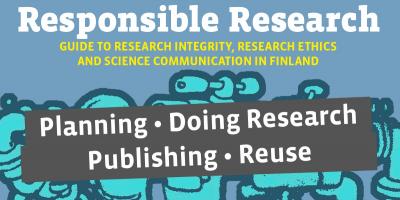The open online course in research integrity teaches participants to consider research integrity as part of the research life-cycle.
Understanding and resolving issues of research integrity is an essential basic skill of the researcher. The online course in research integrity offers an opportunity to practise these skills and consider them as part of one’s own research work.
The online course in research integrity is structured in line with the research work life-cycle:
- Ethical issues when planning research
- The research environment and its impact on research integrity
- Ethical issues when gathering material
- Ethical challenges when planning data management
- Key ethical issues when planning collaboration
- Ethical issues when conducting research
- The risks of research misconduct
- Ethical issues when supervising research
- Ethics and research funding
- Plagiarism and misappropriation as ethical issues
- Authorship and associated ethical challenges
- Research publications and ethical issues relating to choosing research publications
- Ethical issues when publishing research
The course is based on prescriptive ethics. This approach ensures that ethical issues are considered before they turn into ethical problems. A prescriptive ethical approach is facilitated by a functional ethical dialogue. It is important to raise ethical issues as part of the discussion carried out as part of research work.
The course in research integrity is available for self-study and universities also use the course as part of their own training. Participants can log into the platform using their HAKA login.
The course in research integrity was created in collaboration between the University of Tampere, the Federation of Finnish Learned Societies and the national network of PhD institutions in 2015. The course is updated and maintained by the University of Helsinki.
Further information:
You might also be interested in
Tämä teos on lisensoitu Creative Commons Nimeä 4.0 Kansainvälinen -lisenssillä. Detta verk är licensierat under en Creative Commons Erkännande 4.0 Licens. This work is licensed under a Creative Commons Attribution 4.0 International license.
